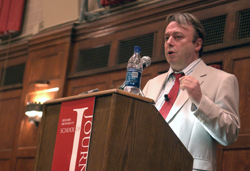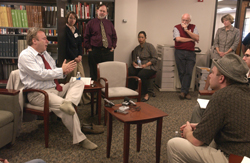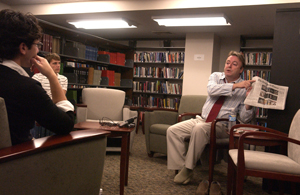Hitchens rattles, engages capacity crowd
By Ben Weller

In typical Christopher Hitchens fashion, the iconoclastic travel writer drew outbreaks of laughter and applause, while at the same managing to rattle just about everyone in the audience at one point or another during his talk at the Indiana Memorial Union Wednesday night.
A standing-room-only crowd packed Alumni Hall to hear the talk, the first of the new School of Journalism speaker series. Hitchens’ speech asked the question, “Was George Orwell a Journalist?” and he answered that by tracing the intellectual journey of a writer who, like himself, didn’t fit easily into any political category.
Orwell began his political education as a soldier in Britain’s colonial army in India and Burma. It was as a soldier in an imperial army that, according to Hitchens, Orwell learned “oppression corrupts the oppressor.”
With that lesson in hand, he set about on a life-long struggle against imperialism, fascism and Stalinism. Orwell, says Hitchens, was the first public intellectual of his day to correctly identify and oppose all three of these forces.

“How did Orwell get this right?” Hitchens asked the audience. “I think he got it right, firstly, by being a participant.”
Orwell’s struggle against oppression led him to the battlefields of the Spanish civil war, where he took a bullet in the throat fighting fascism, and to the slums and coal mines of England, where he undertook the work of an investigative journalist to produce the book The Road to Wigan Pier.
Hitchens described Orwell as “a consummate internationalist,” a term that could just as easily apply to himself. He told this reporter earlier in the day that he no longer calls himself a foreign correspondent, but says, “Internationalism is a big part of what I do.”
He has written from over 60 different countries, including, as he is fond of reminding people, all three of the “Axis of Evil” states.
Perhaps the greatest similarity between Hitchens and Orwell is their affinity for language and the proper use of words. “Look always to the language,” Hitchens said during his speech. “It’s in your own tongue, very often, that you are betrayed…because the formulation’s already been handed to you by the authority.”
Hitchens warns journalists to “avoid the cliche, the stock expression.” He sees cliche as not only bad writing, but as a tool of power.

He likes to tell the story of how when he was writing from Prague, he wanted to avoid mentioning Kafka, since that was what every other writer did. But after he was arrested and the police refused to tell him what he was charged with, he thought to himself, “Shit, now I have to mention Kafka.”
For Hitchens, totalitarianism is itself the cliche, and “that is why it fails.”
Several people, during the question and answer period following the speech, challenged Hitchens on his views on the war in Iraq. While not ceding any ground on his pro-war stance, he did warn the press not to get swept up in the propaganda of war and patriotism. “It’s much more important than ever in wartime,” he said, “that the press be more critical and more vigilant.”

